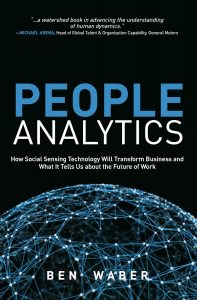MIT scientist and People Analytics author Ben Waber reveals why data—not opinions—should drive workplace decisions, and shape the future of work, collaboration, and corporate strategy.
In this insightful conversation with Ben Waber, visiting scientist at MIT and senior researcher at Ritsumeikan University, as part of Work Design’s ongoing series “What the F* is Happening to the Office?”, explores the rapidly changing nature of work environments. As the co-founder of Humanyze and author of People Analytics, Ben approaches the workplace not merely as a physical space but as a dynamic management tool that shapes how we work. He highlights that work environments are not limited to offices or virtual meetings—they represent a comprehensive set of tools that organizations can adapt over time to enhance both individual focus and team collaboration, even across different cities and time zones.
Reflecting on the rapid shift to remote work during the pandemic, Ben points out that this period expanded the boundaries of what constitutes a reasonable work environment. However, organizations today still struggle with decision-making driven more by opinions and personal preferences than by data. Ben calls for organizations to move away from making decisions “by vibes” and toward a data-driven approach. He emphasizes the need for clear policies that evolve to meet the changing needs of teams, grounded in quantitative analysis and transparency.
Looking ahead, Ben is bullish on the role of data in shaping work environments, particularly as the financial industry begins to use these metrics in investment and valuation decisions. He describes how organizations that embrace data-driven workplace strategies will gain a competitive edge, not just by having cooler offices but by optimizing how work happens. This conversation is part of Work Design’s broader exploration of how the workplace is evolving in a post-pandemic world, bringing fresh perspectives on what the future holds for office spaces and work culture.
Six Key Takeaways
1.) Work Environments as Management Tools: Ben views work environments as holistic management tools that can influence how people work—whether it’s in a physical office or through virtual collaboration platforms.
2.) Data-Driven Decision Making: Ben emphasizes the importance of using data before using opinions. Most of the times opinions shouldn’t override data, but there are times when it can.
3.) Adaptability of Workspaces: The pandemic showed that people can change how they work quickly and effectively if given the right reasons. Ben stresses the importance of designing flexible workplace environments that can evolve with organizational needs.
4.) Collaboration and Communication Across Teams: Organizations should focus on using data to foster better collaboration, especially for teams working in different locations or time zones. Ben highlights the value of understanding and improving communication across diverse teams.
5.) Cultural and Policy Shifts: Ben discusses how workplace policies should be adaptable, changing based on team needs and organizational goals over time. Flexibility is key, but it must be balanced with clear guidance and expectations.
6.) Financial Industry Influence: Ben predicts that the financial industry will increasingly use data on workplace performance to inform investment decisions, making workplace environments a central factor in company evaluations and growth potential.
Chapters
- 01:22 – A Holistic Perspective
- 03:15 – Our Ability to Change
- 04:00 – Decisions by Vibes
- 05:20 – Policy & Process
- 06:55 – The Competitive Advantage
- 09:22 – Better Mandates
- 10:52 – The Data
Resources

Meet Ben Waber:
 Visiting Scientist – MIT, Senior Visiting Researcher – Ritsumeikan University, President and Co-Founder of Humanyze
Visiting Scientist – MIT, Senior Visiting Researcher – Ritsumeikan University, President and Co-Founder of Humanyze
Ben Waber, PhD, is the president and co-founder of Humanyze, a workplace analytics company. Humanyze analyzes existing corporate data to apply its one of a kind analytics to measure Organizational Health and its components of employee-engagement, team-productivity, and organizational-adaptability. These analytics are used by enterprises to answer specific questions related to the impact of Workplace, HR, and Digital Transformation.
He is a visiting scientist at the MIT Media Lab, previously worked as a senior researcher at Harvard Business School, and received his Ph.D. in organizational science from MIT for his work with Alex “Sandy” Pentland’s Human Dynamics group. Waber frequently writes pieces for the Harvard Business Review, HBR Japan, Wired Japan, Bloomberg, and Quartz, among other publications. He regularly appears in many media outlets such as NPR, the New York Times, CNBC, and the Wall Street Journal. He has also given invited talks at some of the most essential institutions in the world, such as the UN, World Economic Forum, Keidanren, Tencent, Samsung, and Google. His book, People Analytics, was published by the Financial Times Press in 2013.
Credits:
- Created By Bob Fox
- Produced By Work Design Studios
- Directed By Bob Fox
- Special Thanks to Katie Sargent and Michelle Weiss

